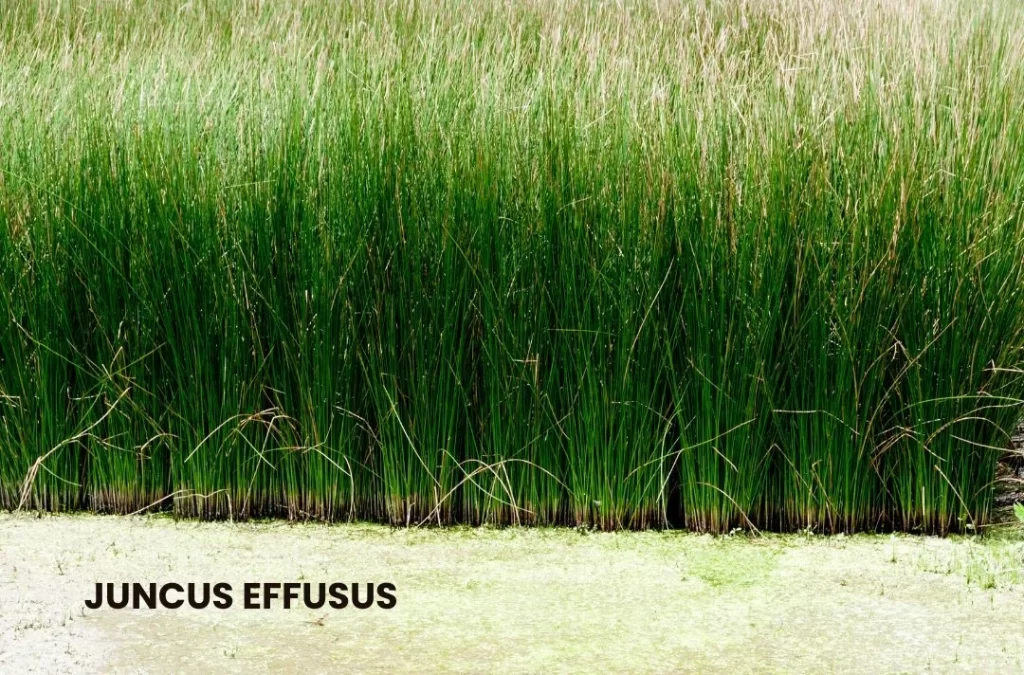Juncus Effusus, commonly known as Common Rush, is a plant used in homeopathy primarily for its diuretic properties.
It is effective in treating various urinary affections, respiratory issues in individuals with hemorrhoids, and other conditions such as arthritis and lithiasis.

Table of Contents
ToggleSOURCE INFORMATION
Scientific Classification
- Family: Juncaceae
- Genus: Juncus
- Species: J. effusus
Origin
- Juncus Effusus is native to wetlands across the globe, including regions in North America, Europe, and Asia.
- It thrives in marshy areas, along stream banks, and in damp meadows.
Historical Facts
- Traditional Use: In traditional medicine, Juncus Effusus has been utilized for its diuretic properties, helping in the elimination of excess fluids from the body.
- It has also been used to treat urinary issues and improve respiratory health in individuals with hemorrhoids.
- Introduction to Homeopathy: The use of Juncus Effusus in homeopathy extends its traditional applications, focusing on urinary and respiratory symptoms, as well as addressing certain types of arthritis and lithiasis.
DRUG PATHOGENESIS
Juncus Effusus acts primarily on the urinary system, promoting diuresis and relieving symptoms of dysuria, strangury, and ischuria.
It also has secondary effects on the respiratory system and the musculoskeletal system, particularly in conditions related to hemorrhoids and arthritis.
DETAILED ORGAN SYMPTOMS
URINARY SYSTEM
- Dysuria: Difficulty and pain during urination, often with a burning sensation.
- Strangury: Painful and slow urination, often drop by drop, indicating an issue with urine flow.
- Ischuria: Suppressed or retained urine, leading to discomfort and potential bladder complications.
RESPIRATORY SYSTEM
- Asthmatic Symptoms: Wheezing, shortness of breath, and difficulty breathing, particularly pronounced in individuals suffering from hemorrhoids.
- Bubbling Sensations: Feeling of bubbles or gurgling in the respiratory tract or abdomen, often associated with mucus or gas buildup.
DIGESTIVE SYSTEM
- Abdominal Flatulence: Excessive gas causing bloating and discomfort in the abdomen.
MUSCULOSKELETAL SYSTEM
- Arthritis: Pain and inflammation in the joints, leading to stiffness and restricted movement.
- Lithiasis: Presence of stones, such as kidney stones, causing pain and discomfort, particularly during urination or movement.
MODALITIES
- Better: Improvement in symptoms with rest and relaxation.
- Worse: Symptoms aggravated by movement or physical exertion.
WHAT ARE MODALITIES IN HOMOEOPATHY?
RELATIONSHIP WITH OTHER DRUGS
Compare:
- Cantharis: Known for treating urinary tract infections and bladder issues with burning pain.
- Berberis Vulgaris: Effective for kidney stones and urinary issues with radiating pain.
- Apis Mellifica: Used for urinary retention, swelling, and burning pain in the urinary tract.
DOSE
- Form: Tincture.
- Potency: First potency (low potency) is typically used.
Frequently Asked Questions
What conditions can Juncus Effusus treat?
- Juncus Effusus is used primarily for treating urinary affections such as dysuria, strangury, and ischuria.
- It is also effective for asthmatic symptoms in individuals with hemorrhoids, abdominal flatulence, arthritis, and lithiasis.
How is Juncus Effusus administered?
- It is typically administered in tincture form or at low potency in homeopathic practice.
Are there any side effects of Juncus Effusus?
- Side effects are generally rare when used in homeopathic doses.
- Some individuals may experience mild digestive disturbances or allergic reactions.
Can Juncus Effusus be used for respiratory issues?
- Yes, Juncus Effusus is effective in treating asthmatic symptoms, particularly in individuals with hemorrhoids.
Meaning of Difficult Words
- Diuretic: A substance that promotes the increased production of urine.
- Dysuria: Painful or difficult urination.
- Strangury: Slow and painful discharge of urine, often drop by drop.
- Ischuria: Retention or suppression of urine.
- Asthmatic Symptoms: Breathing difficulties, such as wheezing and shortness of breath.
- Lithiasis: Formation of stones, such as kidney stones or gallstones.
- Tincture: A solution where a substance is dissolved in alcohol, commonly used in homeopathic remedies.
- Potency: In homeopathy, the strength of a remedy, usually determined by the number of times it has been diluted and succussed (shaken).
Juncus Effusus is a versatile homeopathic remedy that provides relief for various urinary, respiratory, and musculoskeletal conditions, making it a valuable addition to homeopathic treatment protocols.
